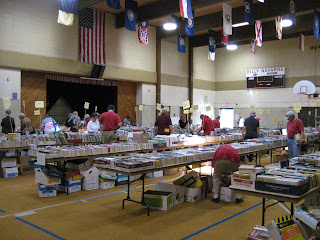For my part, the short answer is yes, it was worth the hours invested. The long answer is that it will take some time to determine whether it pays in significant book sales.
What went right:
1. The People.
When I first presented the idea of a blog tour on my website and on Twitter, the proposition was to write for any blog of any sized audience, on any subject requested. The worst-case scenario -- and this is what I've long trained myself to expect -- was no response at all, and an embarrassing backpedaling and eventual abandonment of the project. To my relief, this was not the case, as I was immediately inundated with requests. To describe this as satisfying would be an understatement. This outpouring of support speaks not to my reputation, but to the kindness and generosity of the literary community and blogosphere as a whole. Here again, I submit to all struggling authors the importance of online social networking as a promotional tool.
Everyone posted their items on time (if an article went up late, rest assured that it was my fault entirely. See "What Went Wrong.") and went above and beyond to ensure everything formatted properly, and further worked to nurture comments and draw traffic.
2. Open Topics
Going into the tour, I feared two things: 1) that I'd be asked to write about the same thing repeatedly -- "What's it like to write a book?" -- which I don't mind, but would get boring for readers following the tour, or 2) that I'd be asked to pontificate on hot-button political issues. While I am paid to write about politics, and enjoy it very much, nothing angers prospective readers more than offering the wrong opinion on, say, health care reform. The goal was to have fun and get the name out, but also to sell books. Thankfully, both fears were unfounded. My hosts were both creative and flexible, and during the month of March, had me write everything from William Shatner devotionals to dinner party etiquette in the post-zombie age.
Engaging the blogosphere was far more effective than simply asking for ad space to plug my book. In a sense, I became a partner with my hosts rather than a parasite, and everyone seemed pleased.
3. The Echo Chamber
It was astonishing and humbling to watch people generously promote my appearances on their blogs. For my part, each day, I posted the daily blog on my website, on Facebook, and on Twitter. Friends echoed ("retweeted") the announcements, as did friends of friends. Many of my hosts did the same. Sites that ordinarily received dozens of hits a day were suddenly receiving hundreds. And linked on each page was my name, book, and website. It was the best publicity one could ask for, and best of all, it was mutual. Hopefully a few blogs got a few new readers.
What went wrong:
1. Overload
The plan was to write 400 words for each blog, each day. It seems, however, that I am incapable of such brevity, and each day's word count generally spilled into the thousands. By the final day, I expect to have written thirty thousand words on various subjects. That's half a book, nearly. Though I budgeted thirty minutes each day for the blog tour (the original plan was to do each week's worth of posts on the preceding weekend) I generally spent upward of two hours on each post, including research and revisions. Simply put, it was exhausting to produce creative and quality prose of such length every evening, in addition to my regular work. In the future, I would plan to learn brevity, or plan 4-day weeks.
2. Technology
Not everyone is a web guru. And many who received pre-formatted blog posts with embedded HTML links simply had no idea how to properly post to their blogs. This is nobody's fault but my own, and I would have been well-served to write a brief how-to guide for each of the major blog services. (That is, Wordpress, Blogger, and LiveJournal.) This would have saved many headaches for my already generous hosts, and a great deal of time spent explaining and re-explaining things by email. Midway through the project, I was so overwhelmed by the task at hand that I had no time to compose decent instructions. Next time, I'll be ready.
3. Timing
Ideally, I would have been better served launching the blog tour immediately after Red Planet Noir's debut. There is a certain momentum attached to a new release that is difficult to sustain. Waiting until March placed me on the ebb of that tide. If the blog tour results in significant sales, it will be due to the "Long Tail" effect. And that's no guarantee, either. It will be some time before I know whether the time and effort invested pays in negotiable currency.
Conclusion
Will I launch a blog tour for my next release? Without question. I enjoy writing, and I enjoyed meeting new people, however virtual. My name, my book, and my content are now present on quite a few websites that ordinarily would have passed me by. And, as they say, the Internet never forgets. Google will keep that content active and "in the mix" for a very, very long time.
Do I recommend blog tours to other authors? "Yes, But." Yes, but be prepared for more work than you expected. Yes, but don't count on everything going according to plan. Yes, but don't count on finding yourself on the New York Times bestseller list overnight.
I suspect that blog tours are here to stay. With that in mind, all it really takes is a bit of planning, careful scheduling, and a lot of writing. It's the best publicity no money can buy.
--
 D.B. Grady is the author of Red Planet Noir.
D.B. Grady is the author of Red Planet Noir.He can be found on the web at http://www.dbgrady.com/.





